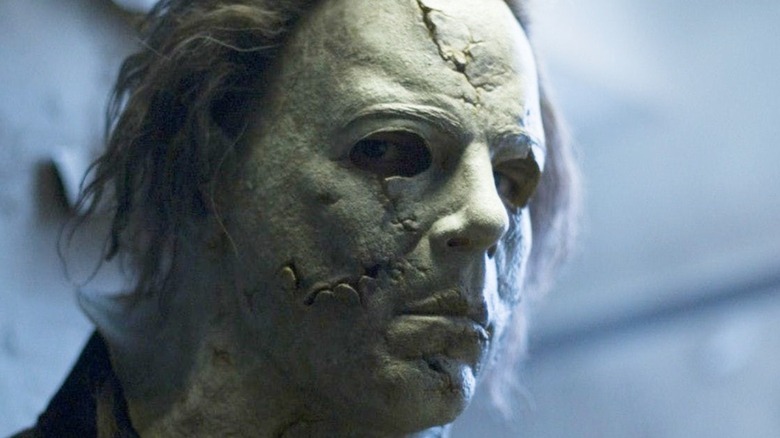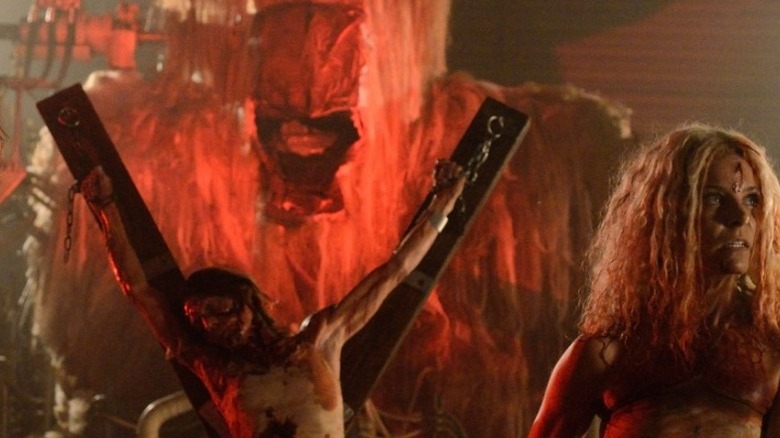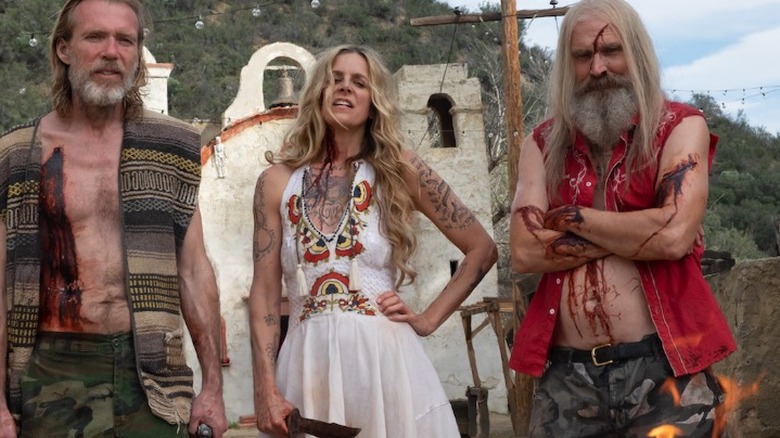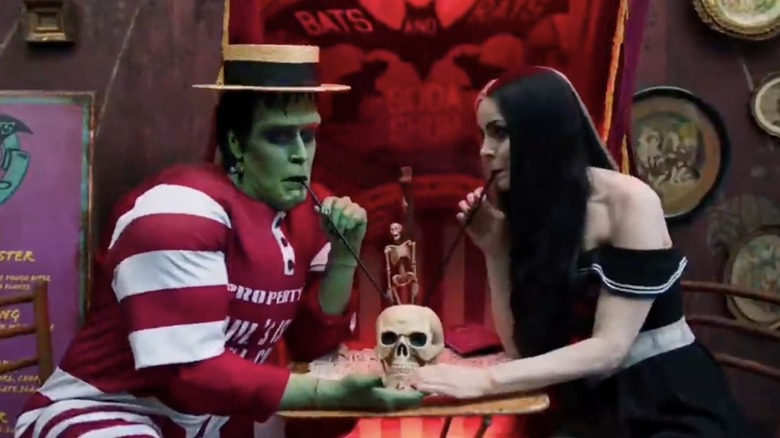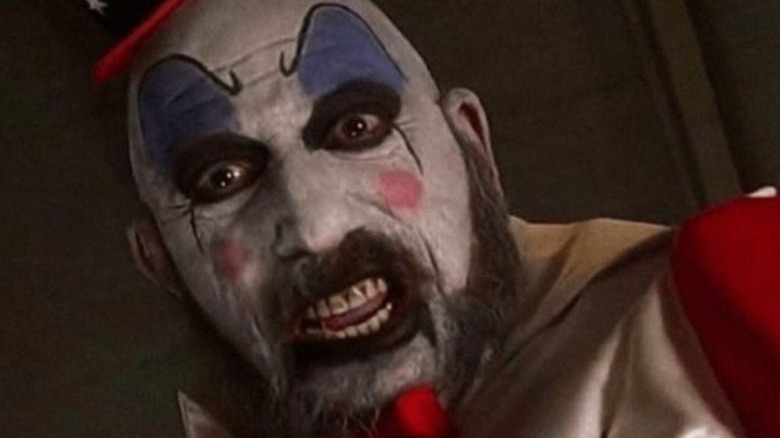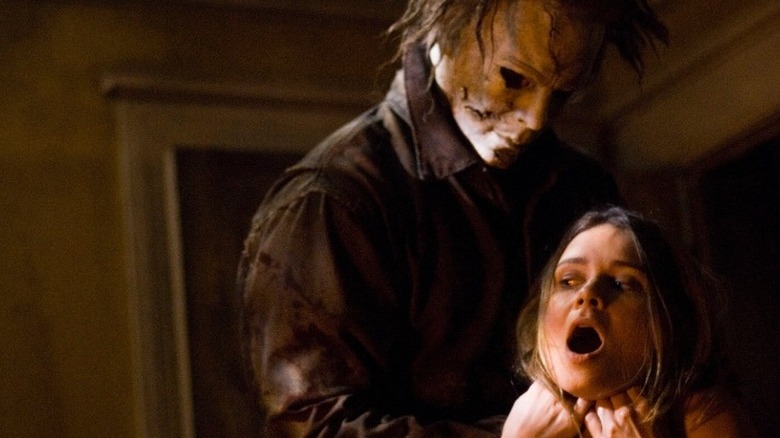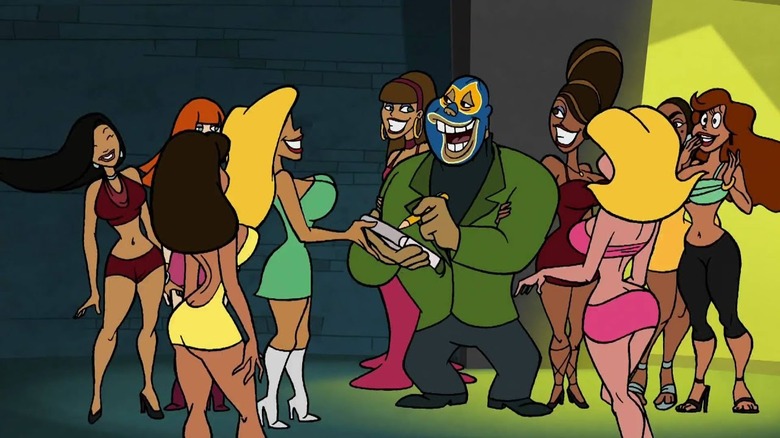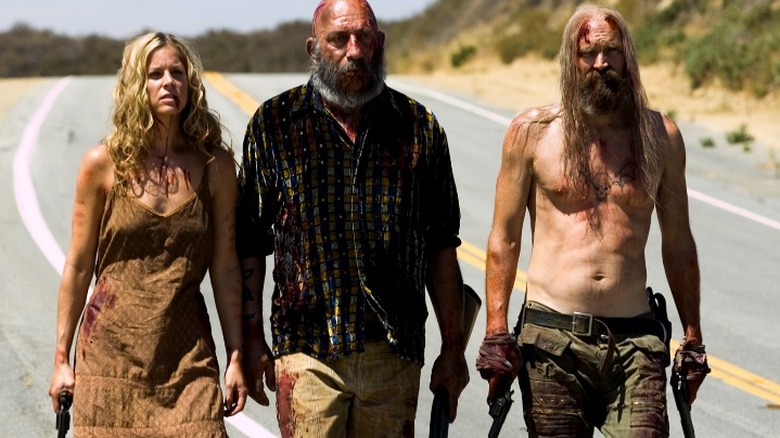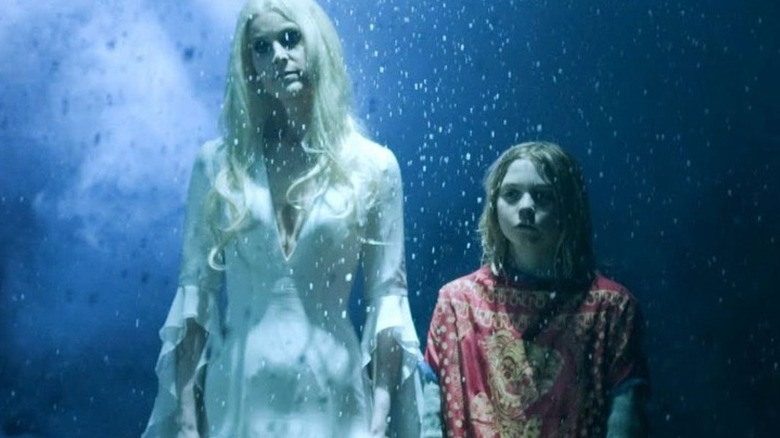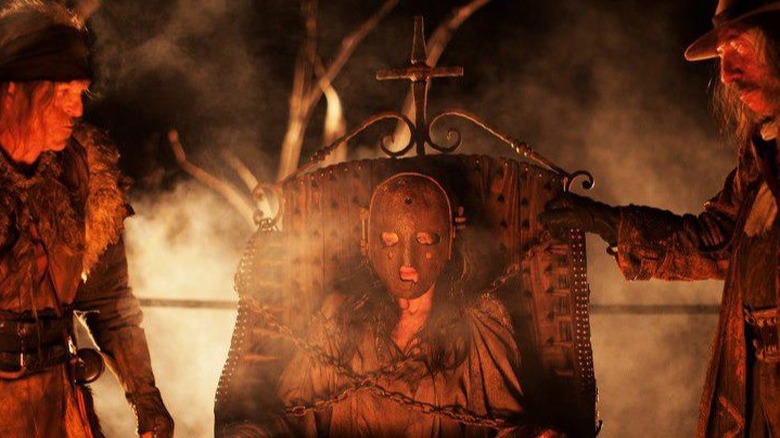Every Rob Zombie Movie Ranked From Worst To Best
Rob Zombie has had an illustrious career. A founding member of the heavy metal band White Zombie, he departed the group in 1996 for his first solo track, "Hands of Death (Burn Baby Burn)," performed alongside Alice Cooper. He'd later go on to receive eight Grammy nominations for his solo efforts. Yet, the colloquial hillbilly rocker has had a similarly successful career elsewhere.
Zombie's music often draws inspiration from the horror genre, mixing conventional metal sounds with the rhythms and narratives of classic horror films. Of course, it makes sense that Zombie would parlay his musical success into filmmaking. With nine feature films to his credit, including the mixed bag of 2022's "The Munsters," Zombie is a filmmaker who's here to stay.
Here, we'll be ranking his filmmaking efforts from worst to best. Naturally, his films are either explicitly horror — like his 2007 short film "Werewolf Women of the SS" – or adjacent to the genre. While his dark visions don't work for everyone, there's no denying Zombie is a filmmaker with a unique legacy.
9. 31
Rob Zombies "31" is not good. A tapestry of uber violence and juvenile antics, it's Zombie's worst impulses manifesting in increasingly repulsive ways. As with most of his filmic output, his real life wife Sheri Moon Zombie stars. She plays Charly, otherwise known as #5. She leads a group of carnies in 1976, kidnapped by a gang of homicidal clowns known as The Heads. The Heads force the carnies to engage in a 12-hour game of survival whereby they must endure a series of mazes, all while being hunted by the clowns. Here, failure means torture and death.
Chainsaws are shoved into victims' crotches, heads are severed, and all manner of domestic weaponry are repurposed for maximum savagery. It's par for the course with Zombie's genre outputs, but here it feels lazy and unfocused. It's nothing he hasn't done better elsewhere. Worse still, the carnies are among the least endearing central quintet seen in some time. Zombie often struggles with developing redeeming characters — though in the horror genre, it doesn't bode well when audiences want the leads dead before the threat even arrives. A game of "31" sounds more fun than sitting through this again.
8. 3 From Hell
"3 From Hell" is a marginal improvement over "31" — though marginal is doing a lot of work here. The third entry in his "Firefly" trilogy, the first being "House of 1000 Corpses" and the second being "The Devil's Rejects," is also the weakest. It's also the first, outside of a three-night engagement through Fathom Events, to not receive a wide theatrical release. It's something of a mess, a movie with good ideas on the periphery that, for whatever reason, never come into focus long enough for the movie writ large to work.
Baby (Sheri Moon Zombie), Otis (Bill Moseley), and Captain Spaulding (the late Sid Haig) have inexplicably survived the shootout at the end of "The Devil's Rejects." In this film, they go on trial for their murderous rampage. Captain Spaulding is executed, and both Baby and Otis are incarcerated. Otis escapes, murdering several people in the process, and endeavors to free Baby as well. All the while, the nation is curiously enraptured by the trio for "reasons" and champions their innocence. (Spoiler, readers: they are not innocent.)
Zombie is working in meta territory, and the idea of exploring the repercussions of sensationalizing awful people isn't a bad idea in theory. It's hard to take it seriously, though, among the iffy acting and senseless violence. When skin is graphically ripped from a face, it's hard to care about its social commentary.
7. The Munsters
Zombie's "The Munsters" should have been a surefire thing. After watching it, it's clear Zombie has a fond love of the property. Positioning his film as a prequel to the 1964 television show was an effective way to tell his own story without feeling too beholden to the source material. Unfortunately, the critical reception was not kind, with critics lambasting everything from the technicolor-like visual style to its casting. While "The Munsters" isn't ready for the contemporaneous urge to contextualize all things "bad" as good, it isn't as dire as critics made it out to be. Yes, it's nothing special, but it's a Rob Zombie movie through and through, and that's worth something!
Perennial Zombie film star Sherri Moon Zombie stars as Lily Munster, alongside Jeff Daniel Philips as Herman Munster and Daniel Roebuck as The Count. Tonally, Zombie's "The Munsters" matches the fuzzy, slapstick, and Transylvanian vibe of the original series. While there isn't much plot in its 110-minute runtime, there's an undeniable charm to its romantic story — especially given the bleakness of Zombie's filmography.
Zombie is a talented filmmaker with an acute visual style. No, "The Munsters" isn't his best. But he is trying something different here, displaying cinematic growth in every lovingly-rendered frame.
6. House of 1000 Corpses
There's a theme here. "House of 1000 Corpses," much like the "Firefly" trilogy capper, is a good idea that's poorly executed. A graphic grindhouse throwback in the vein of "The Texas Chainsaw Massacre," it introduces the Firefly clan, a family of backwoods madmen whose reason for being is murder and slaughter. A group of travelers are coaxed into the family's den, and over the course of the night, find themselves menaced and murdered by the family.
"House of 1000 Corpses" had a long road to release, with the studio fearing an NC-17 rating. Nearly three years passed between filming and release. It was a mild success, and subsequently spawned the two sequels — and in later years, a house at Universal's Halloween Horror Nights. While the movie works in fits and spurts, it feels wildly unfocussed, with Zombie using excessive violence to obfuscate the loose threads. Homage itself does not a movie make, and while Zombie's style was just developing, it would take several more movies before he successfully put his best ideas into practice.
5. Halloween
Rob Zombie's "Halloween" is also not a good movie. The theme persists. The latter half of Zombie's remake is largely a beat-by-beat replica of John Carpenter's seminal slasher, only with the gore quotient turned up tenfold. The prologue, though, endeavored for something different, namely exploring how Michael Myers might have become Michael Myers. Again, the idea itself has merit, but Zombie stumbles right out of the gate.
Anyone who knows anything about child psychology could conceptualize the roots of evil better than Zombie. As a child, Michael Myers endures every bout of savage trauma a child could. He is horrifically bullied at school, called homophobic slurs by his stepfather, and cruelly taunted by his sister. It's a grab-bag of abuse, with Zombie opting to have the entirety of Haddonfield victimize Myers rather than a select group. It's like he read a clinical list of warning signs and threw them all in. Worse still, Zombie largely abandons the idea in his own movie — conceding in the final moments that, yeah, Michael Myers is simply evil, trauma be damned. It's an infuriating move in an already infuriating movie. At this point, Zombie has proven himself to be a director with style to spare without a story worth telling.
4. The Haunted World of El Superbeasto
"The Haunted World of El Superbeasto" is a curious case study for Zombie as a filmmaker. For starters, it's a good movie. It isn't great, though as directed and co-written by Rob Zombie, it's one of his most successful efforts. It is also Zombie's first and only animated effort.
"The Haunted World of El Superbeasto" follows the titular El Superbeasto (Tom Papa), a masked wrestler and exploitation film director, and his sister, Suzi-X (Sheri Moon Zombie), as they endeavor to stop Dr. Satan (Paul Giamatti) from taking over the world. It involves a lot of satanic gobbledygook — but it does have Rosario Dawson voicing Velvet Von Black, and Rosario Dawson is never anything but a welcome presence. It's violent, exploitative, and crude, yet it has considerably more heart than most of Zombie's movies. It's also gorgeously animated and satisfies, especially when released in 2009, an underserved niche. Adult animated fare is hard to come by, and though it's in part due to how small the subgenre itself is, "The Haunted World of El Superbeasto" is one of the best.
3. The Devil's Rejects
"The Devil's Rejects," much as it pains me to say, is the only entry in Zombie's "Firefly" trilogy worth anyone's time. It's hard to pinpoint why, exactly, this entry supersedes both its predecessor and sequel, but the fact remains that it does. "The Devil's Rejects" is no less violent or exploitative than Zombie's other efforts, but there's an endearing grindhouse quality. Rather than feeling like cheap homage, it feels entirely like Zombie's own.
Directly following the conclusion of "House of 1000 Corpses," law enforcement arrives and fires on the family farm, killing several people and sending the surviving members running. Baby and Otis escape together, while not far behind, Captain Spaulding endeavors to join them. It's a road trip of savagery, and while Zombie again takes things too far -– sexual assault of this nature is never necessary -– there's more stylistic and narrative care than he's demonstrated elsewhere. Additionally, the acting is stronger than in his other work. As an exercise in sheer savagery, "The Devil's Rejects" is genuinely terrifying at times. It's Zombie's first successful horror exercise and is a worthwhile reminder of what, with the right script, Zombie can do.
2. Halloween II
Rob Zombie's "Halloween II" is a trial in patience. One watch is likely not enough for audience members to genuinely appreciate what Zombie is doing here. In fact, it might take several viewings for perceptions to shift from "that was awful" to "that's a damn masterpiece." No longer beholden to the framework of Carpenter's original, Zombie's "Halloween II" is largely its own thing entirety — and what a strange, glorious thing it is. Starting with a truncated Haddonfield Memorial Hospital chase a la the original "Halloween II," the movie then jumps forward a year. Survivor Laurie Strode (Scout Taylor Compton) is now living in rural Haddonfield with Sheriff Brackett (Brad Dourif) and his daughter, Annie (Danielle Harris).
Here, Zombie adds subversive, mythic iconography to the Myers story, contending that Myers is driven to kill by ethereal hallucinations of his mother (yes, it's Sheri Moon Zombie) and a white horse. Zombie assembles several striking images — including most successfully, a giant crucified skeleton wearing a Michael Myers mask. It's hallucinatory and consistently engaging. Zombie even successfully interrogates trauma and its legacy. Truly, Zombie is firing on all cylinders here. It rarely gets better than this.
1. The Lords of Salem
With "The Lords of Salem," Zombie delivered a sterling filmic trifecta. The narrative is compelling, the visuals are striking, and the characterization is, for what feels like the first time, endearing and sympathetic. Casting a menagerie of genre icons (including Dee Wallace and Meg Foster) as a group of witches in Salem, Massachusetts, "The Lords of Salem" is confounding — yet gloriously, lovingly realized.
Sheri Moon Zombie delivers one of her best performances as Heidi, a recovering addict and radio DJ who, upon playing an unusual record for a band named The Lords, is plagued by demonic visions of Satanic worship and sacrifice. Zombie's visuals have never looked better, and he delivers precisely the kind of genre love letter that melds his affinity for music and horror to perfection. It's scary, hypnotic, and practically demands repeat viewings. It's a sensationally good time. It's not only Zombie's best, but also one of the best genre homages ever made. It's practically a masterpiece.
